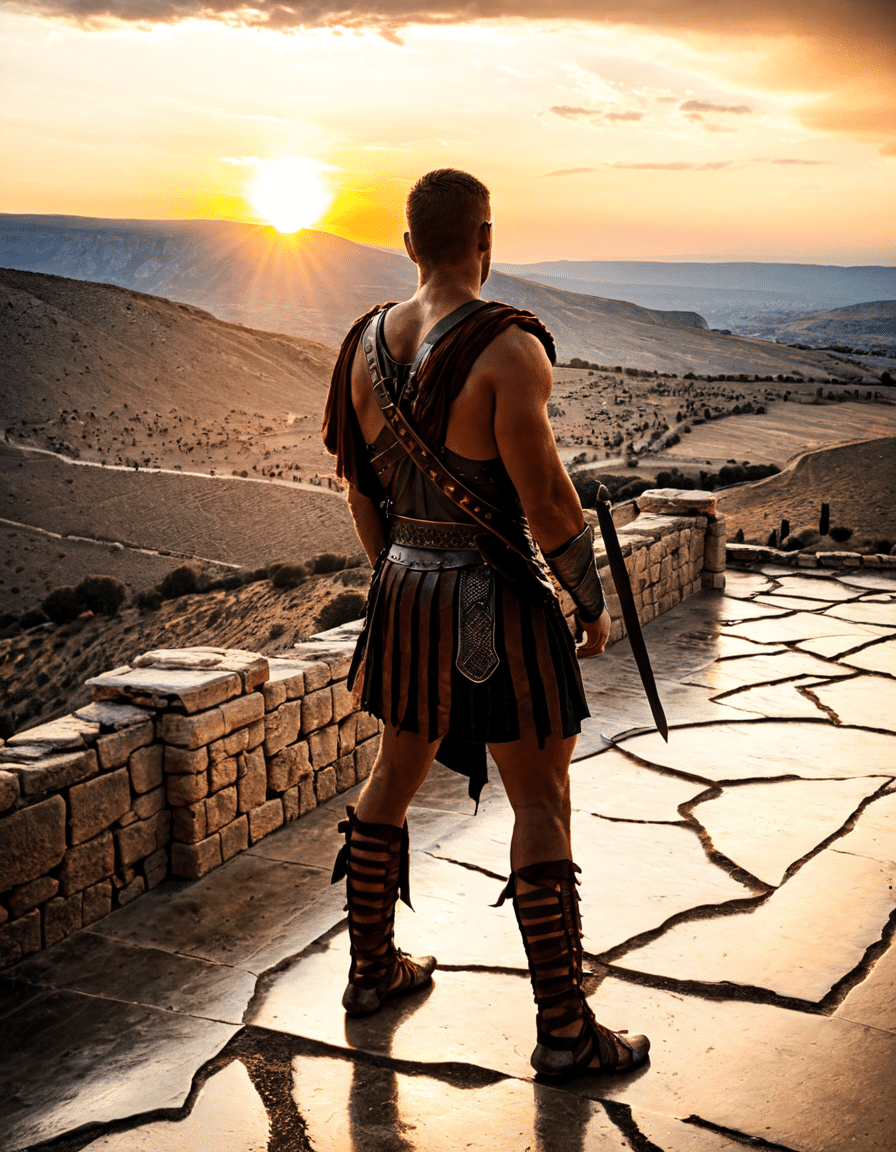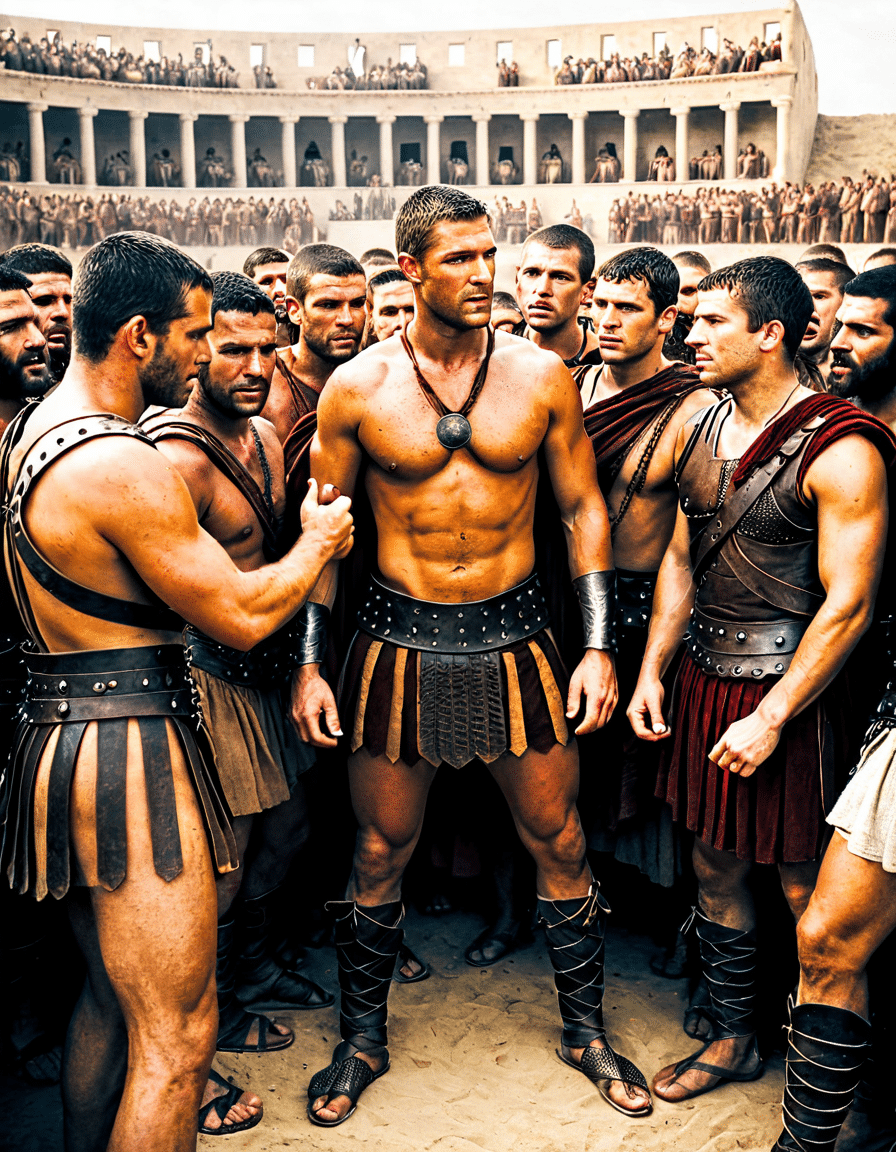When you think of Spartacus, the image of a mighty gladiator rising against the infallible Roman Empire probably leaps to mind. This legendary figure, born around 111 BC in Thrace, transitioned from soldier to gladiator, making him a symbol of resistance and courage. His life story unfolds against a backdrop of political intrigue, social strife, and breathtaking battles that changed history. Let’s dive deep into the saga of Spartacus and uncover how this warrior’s defiance continues to inspire us today.

The Rise of Spartacus: From Thracian Warrior to Gladiator Legend
Spartacus started life as a Thracian warrior; he fought valiantly for the Roman army before his capture. Imagine this: an honorable soldier turned into a slave—how’s that for a twist? This radical shift molded Spartacus’s character and instilled in him fierce determination. His experiences in the Roman military offered a glimpse of the systems at work, but his enslavement opened his eyes to the bitter realities of oppression.
Back then, the Roman Empire was ambivalent; it was both powerful and corrupt. The sheer brutality of slavery in Rome fueled an undercurrent of discontent among the oppressed. Spartacus’s ambition grew amid this chaos, as he yearned for freedom not just for himself but for all enslaved people. His story sets the stage for one of the most audacious rebellions in history.
Spartacus didn’t just rise from the ashes—he led a revolt that echoed through the annals of time. His remarkable ability to unify both gladiators and slaves into an organized force shows us the profound impact of a compelling vision. Now, who wouldn’t root for the underdog taking on a Goliath-like empire?

Top 6 Influential Figures in Spartacus’ Time: Julius Caesar, Scorpio, and Others
Together, these pivotal figures influenced not just the outcome of battles, but the course of history itself. As fans of film and history, we can appreciate how their tales intertwine with Spartacus’s uprising, bringing depth and dimension to the narrative of freedom.
The Gladiatorial Revolution: An Analysis of Spartacus’ Strategy
Spartacus’s tactical brilliance is a fascinating topic for any cinephile. You wouldn’t expect a bunch of gladiators to take on one of the mightiest armies of their time, but they did, using guerrilla tactics that mystified their Roman counterparts. Imagine ambushes, deceptive maneuvers, and lightning-fast strikes that capitalized on the element of surprise. It’s the ultimate underdog story.
The gladiatorial revolution wasn’t just about brute force; it was about strategy and unity. Key battles, such as the initial skirmishes in Capua, showcased Spartacus’s ability to inspire and lead. His forces, often outnumbered, won stunning victories. The fact that these gladiators could momentarily overthrow the might of Rome tells us something profound about the human spirit.
Analyzing Spartacus’s approach can shed light on how underdogs often find their way to prominence through innovation and sheer willpower. They’ve got grit, folks! This triumph became a beacon of hope for those dreaming of freedom, igniting revolutions long after Spartacus took his last stand.
Cultural Impact: The Legacy of Spartacus in Literature and Film
From Stanley Kubrick’s iconic 1960 film “Spartacus” to modern interpretations, the story of this gladiator has captivated audiences for decades. Kubrick’s film remains a benchmark in cinematic history, earning accolades for its portrayal of rebellion against oppression. Who can forget Kirk Douglas’s soaring performance that made the character immortal? It’s a cult classic that resonates with audiences, pushing the boundaries of what cinema can portray.
The adaptations of Spartacus’s story reflect society’s attitudes toward rebellion and freedom, mirroring various historical events. For instance, HBO’s series “Spartacus: Blood and Sand” provided a gritty lens into the life of the gladiator, garnering a dedicated fanbase desperate for more tales of his fight for liberation. Such portrayals remind us that the fight against tyranny isn’t just ancient history—it’s alive and relevant.
These films and shows not only engage viewers but also challenge them to confront their comfort with the status quo. As cinema continues to evolve, the legacy of Spartacus serves as a powerful reminder of how art can stir empathy and incite action in the face of injustice.
Lessons from the Life of Spartacus for Contemporary Social Movements
Today, Spartacus stands as a symbol for various social movements that echo his plight. The lessons drawn from his resistance resonate with modern campaigns like Black Lives Matter and the Arab Spring. The connection lies in the struggle for freedom and dignity, as well as the importance of unity in the face of oppression.
Spartacus’s story encourages contemporary movements to employ strategies of civil disobedience, encouraging people to voice their discontent in innovative ways. This ties beautifully into the power of symbolism. Just as Spartacus’s uprising inspired hope, modern symbols like the raised fist have become synonymous with various struggles for justice.
In a world increasingly challenged by disparities and injustices, Spartacus serves as a calling to all individuals to challenge the established order and fight for equity. After all, who wouldn’t want to don their own metaphorical armor and rally against the giants of our time?
The Historical Debate: Spartacus’ Enduring Mystique
Despite his demise around 71 BC, the debate around Spartacus’s legacy remains vibrant. Should he be hailed strictly as a freedom fighter, or do his actions paint him as a leader of chaos? This inquiry offers rich ground for discussion, especially considering how history shapes our understanding of justice and rebellion.
Historians have long engaged in spirited arguments over Spartacus’s motives and the consequences of his revolt. Some see him solely as a figure of revolt against oppressive systems, while others argue he brought strife and instability. Each interpretation affects how we view not just Spartacus but the nature of resistance itself.
Through these differing perspectives, the enduring mystique of Spartacus invites us to reflect on our values. As modern viewers and participants in social discourse, we can grapple with these historical notions and apply them to our current struggles for justice and equality.
Engaging with the Legacy of Spartacus: A Call for Modern Reflection
Spartacus remains a beacon of courage against tyranny, igniting movements and dialogues that challenge the status quo. His story invites us to reflect on our contemporary battles against oppression and to rally for the rights of every individual. It compels us to ask—how can we embody Spartan ideals in our actions today?
By embracing the spirit of Spartacus, we can challenge injustices and strive for a better world. Let’s reflect on his legacy and consider how we can stand up against the wrongs committed in our societies. This isn’t just a story about a gladiator; it’s a collective call to action for all humanity.
In a world where movies and stories influence culture, Spartacus’s fight reminds us of the enduring power of rebellion. From inspiring blockbuster films to shaping our social dialogues, his legacy lives on. So let’s gather our courage, channel our inner Spartacus, and dare to fight for justice!
Spartacus: The Legendary Gladiator Who Led a Revolution
Did You Know?
Ah, Spartacus! This iconic figure has inspired countless tales, from movies to games. While most know him as the fearless gladiator who led a major slave revolt against the Roman Republic, there’s so much more to the man behind the legend. Did you ever consider how his story has woven its way into our pop culture? For instance, the popularity of the character has influenced various adaptations, including the character dynamics akin to the Dexter New blood cast which show that even the darkest tales can inspire complex characters.
Interestingly, Spartacus was originally a Thracian warrior before he became a gladiator. His background in battle likely gave him the skills he needed to lead. Speaking of leadership, did you know that Kim Klacik is an inspiring political figure who’s made waves? While seemingly unrelated, both Spartacus and figures like Klacik are symbols of resistance. They embody the thirst for change—pushing boundaries and shaking the status quo, albeit two millennia apart.
Legacy in Modern Media
Spartacus’ tale resonates through many different forms of entertainment today. Ever notice how some video games echo his rebel spirit? In Civilization VII, for instance, players can channel their inner Spartacus by leading uprisings and empowering the oppressed. This reflects how engaging narratives can inspire players to rethink history. Then you have pop icons like Taylor Swift, whose concert in Vienna brought an empowering message to fans—a nod to the revolutionary spirit that Spartacus ignited among his followers.
Even in animated adventures, like those found in the beloved Teenage Mutant ninja turtles series, themes of rebellion and fighting for what’s right mirror the essence of Spartacus. It’s fascinating how a gladiator from ancient times can spark stories that appeal to modern audiences, showing how his legacy is truly timeless.
The Human Element
The sheer humanity of Spartacus’s story is what makes it relatable today. He fought against not only oppressors but became a rallying point for others to believe in their strength. And just like Luka Modric, whose career is built on dedication and skill, Spartacus’s journey was all about perseverance in the face of adversity. His fight wasn’t just for freedom; it was about giving hope and inspiring people to stand up assertively.
In a world rife with challenges, narratives flow, including the sports arena, as seen in recent Padres Vs Washington Nationals match player Stats, showcasing similar themes of competition and resilience. Even fashion can hint at a rebellious spirit; brands like Mistress Rocks draw inspiration from empowered tales. Whether it’s work in movies, sports, or fashion, the story of Spartacus continues to fuel discussions, reminding us of the intertwined nature of history and our present.





